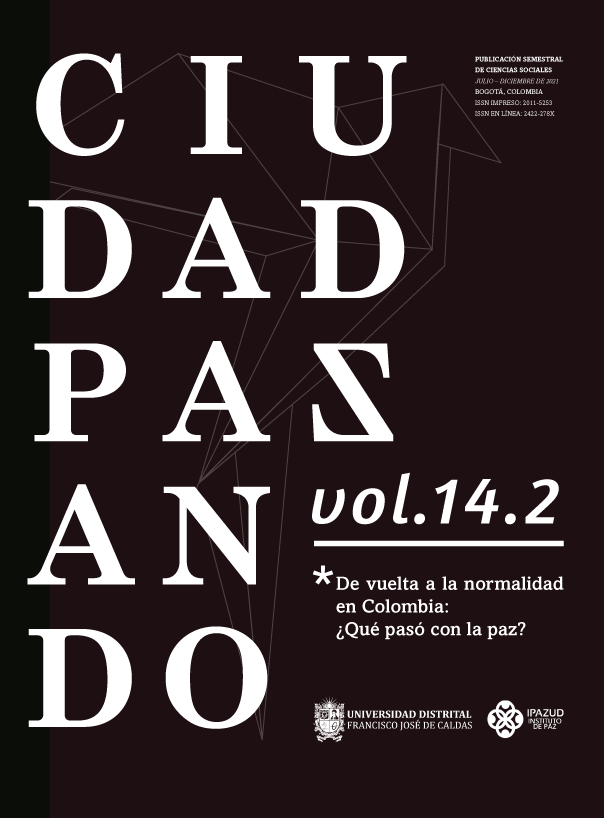DOI:
https://doi.org/10.14483/2422278X.17812Published:
2021-09-09Issue:
Vol. 14 No. 2 (2021): junio - diciembre. De vuelta a la normalidad en Colombia: ¿Qué pasó con la paz?Section:
Pensando regionesEl coronel tiene quien le escriba. Memorias de un héroe o un villano en Llana Caliente
The colonel does have someone to write to him. Memories of a hero or a victimizer in Llana Caliente
Keywords:
Memoria, disputa, identidad, asimetría, silencios, énfasis (es).Keywords:
Memory, dispute, identiy, asimmetry, silences, emphasis (en).Downloads
Abstract (es)
Este articulo describe y analiza las luchas por la memoria en torno a la figura del coronel Rogelio Ramos Correa durante los hechos violentos ocurridos el 28 de mayo de 1988 en el corregimiento Llana Caliente en la región del Magdalena Medio, erigido por unos como un héroe, condenado por otros como un victimario. Una lucha por la memoria entre las Fuerzas Militares del Estado y el Movimiento de Víctimas de Crímenes de Estado en las que se ponen de presente los énfasis y los silencios en la reconstrucción de los hechos, los encadenamientos causales y sus marcos interpretativos, la asimetría en los recursos de que disponen las partes para imponer su versión y el punto de partida de la lucha desde el momento mismo en que se producen los hechos, dado el impacto que tiene el primer momento en la instalación duradera de una u otra narrativa en la memoria colectiva.
Abstract (en)
This article illustrates a battle for memory around the figure of Colonel Rogelio Ramos Correa over the violent events that occurred on May 28, 1988 in the Llana Caliente district in the Magdalena Medio region, erected by some as a victim, condemned by others as a victimizer. A struggle for memory between the State Military Forces and the Movement of Victims of State Crimes in which the emphasis and silences in the reconstruction of the facts, the causal chains and their interpretative frameworks, the asymmetry in the resources available to the parties to impose their version and the starting point of the fight from the moment the events occur , given the impact that the first moment has on the lasting installation of one or another narrative in the collective memory.
References
Centro de Comunicación y Educación Popular. (2017). Resistiendo al olvido. La masacre de Llana Caliente en San Vicente de Chucurí. Anarkismo. https://www.anarkismo.net/article/30318
Centro Nacional de Memoria Histórica. (2013). Recordar y narrar el conflicto. Herramientas para reconstruir memoria histórica. Imprenta Nacional.
Equipo Nizkor. (1999). Colombia Nunca Más. Crímenes de lesa humanidad Zona 5 Magdalena Medio Santandereano.
Escobar, A. (10 de enero de 1993). Batallón antiguerrilla del nororiente: En pie. El Tiempo. https://www.eltiempo.com/archivo/documento/MAM-11411
Farias Cruz, A. (20 de abril de 2019). El retorno de Llana Caliente. La Silla Vacía. https://lasillavacia.com/silla-llena/red-santandereana/retorno-de-llana-caliente-70829
Ferreira, D. (3 de junio de 2018). Treinta años de la masacre de Llana Caliente. El Espectador. https://www.elespectador.com/colombia2020/justicia/verdad/treinta-anos-de-la-masacre-de llana-caliente-articulo-856746
Grupo de Memoria Histórica. (2008). Trujillo: Una tragedia que no cesa. Editorial Planeta
Grupo de Memoria Histórica. (2010). La Rochela: Memorias de un crimen contra la justicia. Fundación Semana y Taurus Editores.
Jurado, J. (29 de diciembre de 2016). El último cumpleaños del coronel. Jaime Jurado Alvarán. https://jaimejurado.wordpress.com/2016/12/29/el-ultimo-cumpleanos-de-un-coronel/
Portelli, A. (1989). Historia y memoria: La muerte de Luigi Trastulli. Historia y Fuente Oral, (1), 5-32.
Portelli, A. (2003). La orden ya fue ejecutada. Roma, las Fosas Ardeatinas, las memorias. Fondo de Cultura Económica.
Proyecto Colombia Nunca Más (2000). Colombia Nunca Más. Crímenes de lesa humanidad Zona 14, I y II. CINEP.
Sánchez, G. (2004). Guerras, memorias e historia. En: Raynald, B. Bracamonte, J. y Degregori, I. (Ed.) Memorias en conflicto: Aspectos de la violencia política contemporánea. Institut Francais D'etudes Andines, Instituto de Estudios Peruanos, Red para el Desarrollo de Ciencias Sociales en el Perú. https://doi.org/10.4000/books.ifea.832
Sin Autor. (3 de julio de 1988). Zona de candela. Semana https://www.semana.com/nacion/articulo/zona-de-candela/10418-3
Tilly, C. (2003). The Politics of Collective Violence. Cambridge University Press. https://doi.org/10.1017/CBO9780511819131
Traverso, E. (2010). El pasado. Instrucciones de uso. Prometeo Libros.
Vidas silenciadas. (1 de octubre de 2019). Base de datos de víctimas silenciadas por el Estado en Colombia. https://vidassilenciadas.org/
How to Cite
APA
ACM
ACS
ABNT
Chicago
Harvard
IEEE
MLA
Turabian
Vancouver
Download Citation
License
Copyright (c) 2021 Ciudad Paz-Ando

This work is licensed under a Creative Commons Attribution-NonCommercial-ShareAlike 4.0 International License.
The Ciudad Paz-ando Journal (RCP) is an open access publication, without economic charges for authors or readers, whose biannual publications are made under the terms of the Creative Commons Attribution - Non-commercial - Share the same License (CC-BY-NC -SA 2.5 CO), with which others may distribute, remix, retouch, and create from the work in a non-commercial way, as long as they give credit and license their new creations under the same conditions.
The copyright holder is Ciudad Paz-ando journal, retaining all rights without restrictions, respecting the terms of the license regarding the consultation, download and distribution of the material.
When the work or any of its elements are in the public domain according to the applicable current law, this situation will not be affected by the license.
Likewise, we encourage authors to deposit their contributions in other institutional and thematic repositories, with the certainty that culture and knowledge is a good for all and for all.

